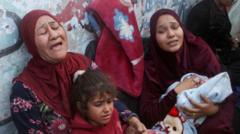A recent UN report indicates that approximately 70% of civilians killed in the Gaza conflict were women and children, raising alarms about potential war crimes and humanitarian law violations amid ongoing violence.
UN Reports Alarming Civilian Casualty Rates in Gaza Conflict

UN Reports Alarming Civilian Casualty Rates in Gaza Conflict
UN findings reveal that nearly 70% of deaths in Gaza's war are women and children, highlighting severe humanitarian concerns.
The United Nations Human Rights Office has released a troubling report indicating that close to 70% of the casualties from the Gaza war over a six-month period are women and children. The report, following an analysis of verified victims, reveals that around 44% were children and 26% were women, underscoring the devastating impact of the conflict on non-combatants.
According to the UN, the high number of civilian deaths is primarily due to Israel's deployment of weaponry that affects wide areas in densely populated regions, although some fatalities may also result from misfired projectiles by Palestinian armed groups. The agency's investigation into these fatalities has revealed "unprecedented" violations of international law, prompting discussions on possible war crimes and related atrocities.
From November 2023 to April 2024, the UN verified the deaths of 8,119 individuals in Gaza, with a significant percentage of these casualties occurring in residential buildings. The demographic data highlights a tragic trend, revealing that the majority of those killed were young children aged five to nine. The UN's findings illustrate a disturbing pattern of "indifference" towards civilian death during warfare and the consequences of military strategies applied in the region.
In response to the report, Israeli officials have reiterated their commitment to targeting Hamas while implementing measures to safeguard civilian lives through the use of precision munitions. The UN Human Rights Chief, Volker Türk, emphasized that the level of civilian casualties represents a failure to adhere to critical principles of international humanitarian law, specifically noting the importance of distinguishing between combatants and civilians, the concept of proportionality in attacks, and the necessity of precautions during military actions.
Conditions on the ground remain dire, particularly in northern Gaza, where aid groups report that the population has been under siege. Aid deliveries have been critically limited, with no food entering the area during the initial weeks of a recent Israeli ground offensive against Hamas, raising international concerns surrounding humanitarian support.
Humanitarian leaders, such as Jan Egeland from the Norwegian Refugee Council, have voiced their shock at the devastation in Gaza, likening the situation to the aftermath of major historical conflicts. Egeland stressed that it is predominantly women and children who bear the brunt of this ongoing war, calling into question the rationale behind the extensive violence and destruction.
Israel's current military operations began following a Hamas attack on 7 October 2023 that resulted in significant Israeli casualties and hostages. The increasing civilian death toll and humanitarian crises have drawn calls from international leaders for accountability and a reassessment of the ongoing conflict.























